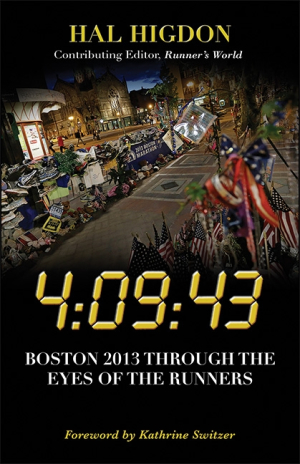4:09:43
Boston 2013 through the Eyes of the Runners
Putting a focus on the runners instead of the tragedy, this account of the 2013 Boston Marathon offers hope and a keep-going attitude.
The 2013 Boston Marathon will inevitably be remembered for the two bombs that went off and the deaths and injuries they inflicted. In 4:09:43, Hal Higdon collects the memories of runners who took part in the event, creating a composite portrait of a day that began as an anticipated race and ended in tragedy.
The book talks about the race chronologically, so most of the anecdotes included involve runners preparing for the event or talking about the challenges they faced during the route itself. Higdon, who has covered the Boston Marathon, and running in general, for many years, was not in attendance at the 2013 race, so many of the midrace reactions he includes come from social media or published articles. His knowledge of the event comes through as he explains why different sections of the route are particularly difficult, or as he details the culture of running and the importance of the Boston race to first-time participants.
In many cases, the book gives quick backstories of the runners who participated that day: a Scottish runner who came to Boston for the first time; a mother who luckily told her daughter not to bother meeting her at the finish line because it would be too crowded; an experienced but legally blind runner and the radio host who served as his guide. As readers already know how the story ends, some of the details—such as runners lamenting a poor time or describing the difficult adjustment to running downhill—can sometimes feel insignificant. Still, this approach does establish the normalcy that the attacks unexpectedly shattered.
Where 4:09:43 excels is in its final chapters, as those who witnessed the bombings give their own accounts of what happened. The book does a nice job of focusing on the runners’ often-confused reactions and the ways race fans and participants pulled together when the attack came. John Munro, the Scottish runner, talks about recovering from an injury in the medical tent when he heard the explosion. Tracy and Chris McGuire, a married couple, recall trying to locate one another amid the commotion.
Perhaps the most affecting story comes from runner Sarah Mutter, who along with forty others was given food and a place to recoup by a concerned resident, then received a phone call about a death in the family the night before. Stories like these effectively humanize the experience of the marathon bombing while keeping the focus on the runners rather than the crime.
Much like a marathon, the book takes a while to get where it’s going, but the payoff comes right at the end.
Reviewed by
Jeff Fleischer
Disclosure: This article is not an endorsement, but a review. The publisher of this book provided free copies of the book and paid a small fee to have their book reviewed by a professional reviewer. Foreword Reviews and Clarion Reviews make no guarantee that the publisher will receive a positive review. Foreword Magazine, Inc. is disclosing this in accordance with the Federal Trade Commission’s 16 CFR, Part 255.

